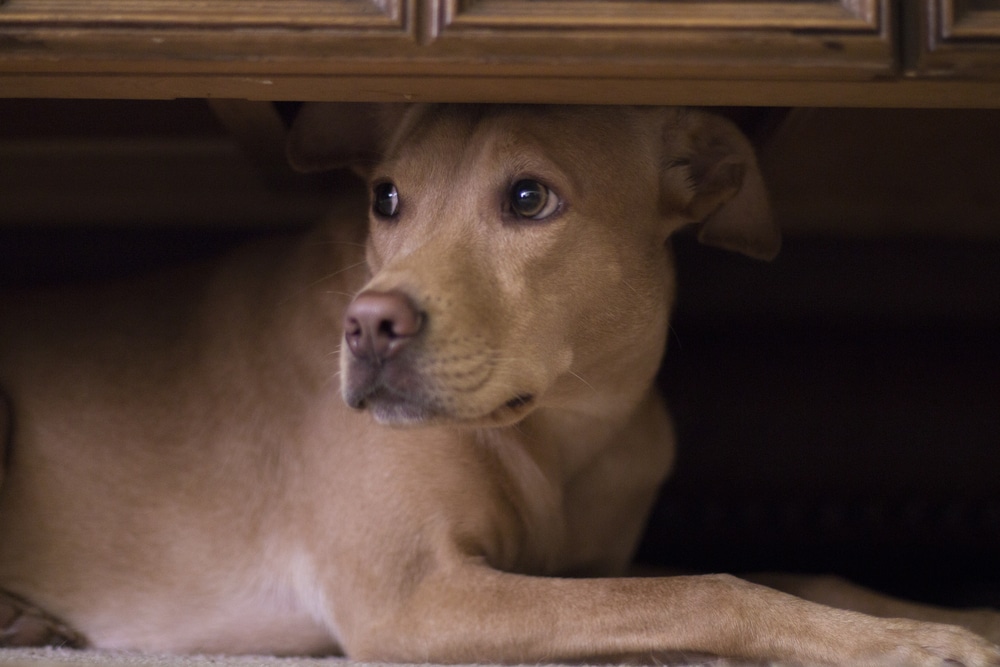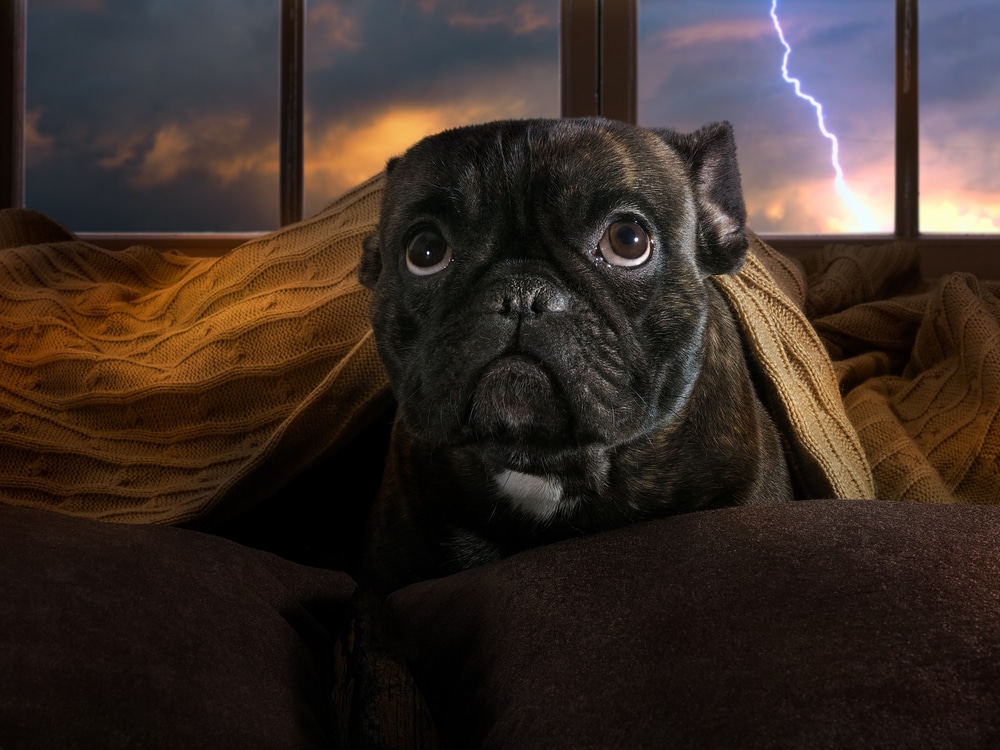Your beloved pup may be (and hopefully is) filled with joy and enthusiasm. However, this can all change in an instant thanks to a thunderstorm. Have you ever wondered why dogs are afraid of thunder? And how can you help them when you notice the signs?
Dogs may be scared of thunder due to lack of exposure and socialization, genetics, past trauma, personality, thunder’s loudness, the preceding lightning flashes, and their ability to sense changes in atmospheric pressure and temperature before a storm. Whatever the cause, it is understandable why dogs may fear this natural phenomenon.
Table of Contents
What Causes Thunder Phobia In Dogs

A dog’s fear of thunder (and maybe even other things such as rabbits) can exist due to multiple reasons. Here are some of them.
Lack Of Exposure Or Socialization
Exposure and socialization from a young age are crucial to prevent the development of thunder phobia in dogs. If puppies are not exposed to different people, animals, and environmental situations, which may include loud noises, they can become fearful and aggressive as they get older and encounter them.
Genetics
Genetics is thought to be a major factor in determining if a dog has thunder phobia, with herding and working breeds being the most prone. Environmental influences can also contribute, but genetics are likely the main contributor.
Past Trauma
Dogs who have experienced traumatic events, such as being in a thunderstorm or hearing loud noises, can develop thunder phobias. Traumatic experiences can lead to fear and anxiety, which can manifest in different ways.
Anxiety Or Fear
Canines can also develop thunder phobia due to certain environmental cues. For example, if a dog associates a thunderstorm with something negative, such as being confined in an unfamiliar space or experiencing physical discomfort during the storm, it may start to associate storms with fear and anxiety. Some dogs also naturally have more anxiety and fear than others.
Loud Noises
Dogs with noise phobia can display a range of reactions to loud noises, such as thunder and fireworks, ranging from mild stress to severe panic. In extreme cases, the fear can be so intense that it causes a complete shutdown of the animal.
Changes In Barometric Pressure
In periods of fluctuating barometric pressure, dogs may become anxious and fearful due to the increased static electricity. This makes it easier for thunder to travel through the air, triggering a heightened sense of awareness in our canine companions. As a result, they can develop thunder phobia.
What Are The Signs Of Dogs Being Afraid Of Thunder?
When a dogs are afraid of thunder, they will show certain signs owners should be aware of. Here’s what they are.
Panting And Shaking
Your pet may experience a heightened state of stress during thunderstorms, which results in heavy panting and uncontrollable shaking. This is their body’s reaction to the unfamiliar sound or environment. These can be signs they are trying to cope with their fear.
Hiding Or Seeking Comfort
When thunderstorms occur, dogs may respond in various ways. Some will hide or seek comfort by going to their owners, hiding under furniture or in closets, or barking and whining loudly. These reactions are a sign of fear and can be an indication they need reassurance from their owners.
Destructive Behavior
A dog may express their fear of thunder through destructive behaviors such as chewing and scratching furniture, trying to dig or claw out of the house/yard, becoming aggressive toward people and other animals, or attempting to escape and hide.
Excessive Barking And Howling
Dogs that exhibit signs of fear during thunderstorms may bark or howl excessively. This behavior usually indicates anxiety, stress, or fear. However, it is important to note that excessive barking and howling could also be caused by other issues, such as separation anxiety, boredom, or aggression.
How To Help Your Dog Cope With Thunderstorms
Thunderstorms can be a stressful experience for dogs. The thunder and flashes of lightning can cause even the bravest dog to become scared and anxious. To help your pup cope with these storms, there are several steps you can take.
Provide A Safe And Secure Atmosphere
Make sure your dog has ample space to feel safe during a thunderstorm. Consider setting up a special corner in your home – with their favorite blanket, toys, and treats – so they can retreat there whenever they need. This is also a benefit of crate training, since you’ll have already established this space for them.
Keep Them Distracted
Play calm music or give them interactive toys to keep their mind off the storm.
Try Natural Soothers
Natural calming remedies like rescue remedy drops may help ease your pup’s anxiety during a storm. Remember to always check with your veterinarian before applying any remedies such as these.
Exercise Before The Storm
Take your pup for an extra-long walk, run, or playtime before the thunderstorm is expected to hit. This can help tire them out and make them more likely to take a nap during the storm.
Acclimate Them To The Sound
Play pre-recorded thunderstorm sounds at a low volume while giving your pup lots of treats and praise, associating the sound with something positive. Doing this regularly can help them become more comfortable hearing that particular sound.
Don’t Comfort Them Too Much
When comforting a scared pup during a storm, it’s important to remember not to overdo it. Too much attention can reinforce the fear, so instead, try a more gentle approach like petting or providing calm reassurance.
Talk To Your Vet
If your pup’s thunderstorm anxiety is severe and nothing seems to be working, speak with your veterinarian. They may recommend medication or other treatments to help alleviate your pup’s fear.
In Conclusion: Why Are Dogs Afraid of Thunder
When a thunderstorm is approaching, it can cause considerable stress and anxiety in dogs. In that case, pet owners should be aware of their pup’s reactions and take the necessary steps to provide them with comfort, security, and a calming atmosphere. If the anxiety persists, consulting a vet is recommended to find more effective treatments for the fear. Also, remember to be patient as helping some dogs will take longer than others, but with the right care they’ll eventually get there.
What is your experience with your pup in a thunderstorm? What have you found to be successful? Let us know in the comments below!
